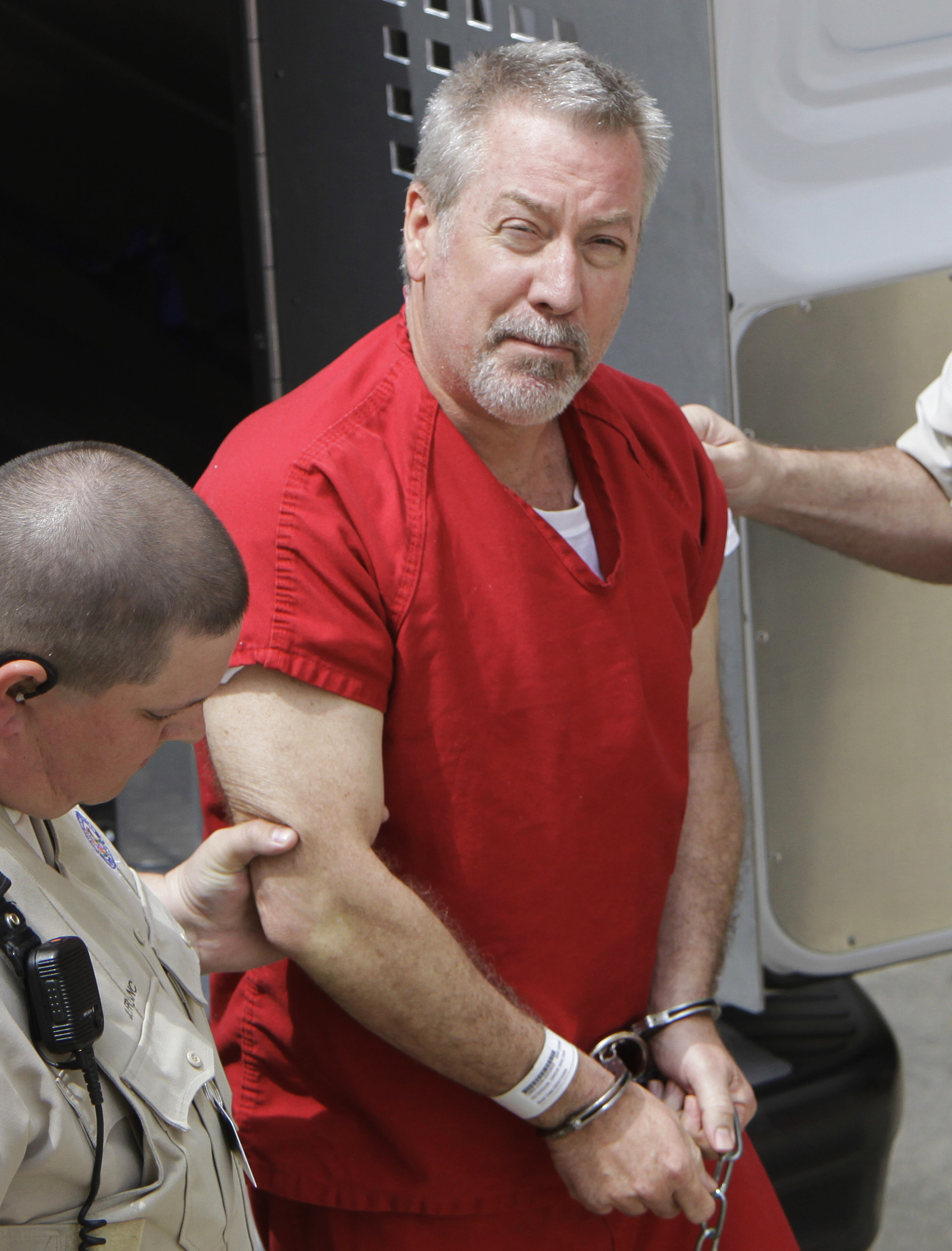Peterson judge, again, to rule on mistrial motion
Wednesday, August 15, 2012
 In this May 8, 2009 file photo, former Bolingbrook, Ill., police sergeant Drew Peterson arrives at the Will County Courthouse in Joliet, Ill., for his arraignment on charges of first-degree murder in the 2004 death of his former wife Kathleen Savio. At Peterson's murder trial Tuesday, Aug. 14, 2012, Judge Edward Burmila said he will announce his decision on a mistrial motion Wednesday morning. He is considering a possible mistrial after another blunder from prosecutors in the former police officer's trial. (AP Photo/M. Spencer Green, File)
In this May 8, 2009 file photo, former Bolingbrook, Ill., police sergeant Drew Peterson arrives at the Will County Courthouse in Joliet, Ill., for his arraignment on charges of first-degree murder in the 2004 death of his former wife Kathleen Savio. At Peterson's murder trial Tuesday, Aug. 14, 2012, Judge Edward Burmila said he will announce his decision on a mistrial motion Wednesday morning. He is considering a possible mistrial after another blunder from prosecutors in the former police officer's trial. (AP Photo/M. Spencer Green, File)MICHAEL TARM
JOLIET, Ill. (AP) - A judge Wednesday again is poised to decide whether to cut short former police officer Drew Peterson's murder trial - the third time in as many weeks he is giving serious consideration to declaring a mistrial after a blunder by prosecutors.
Their latest misstep came as proceedings seemed to be going the prosecution's way in recent days as they sought to prove Peterson, 58, killed his third wife, Kathleen Savio, in 2004. He was charged after his fourth wife, Stacy Peterson, disappeared in 2007.
Judge Edward Burmila seemed unmoved Tuesday by apologies from an attorney for the state after she broached a subject she was told not to mention to jurors - raising the possibility the trial could end with the judge letting Peterson go free.
Declaring a mistrial and concluding prosecutors intentionally violated his orders could lead to his release - though that would be the most extreme measure Burmila could take.
Burmila also could declare a more standard mistrial, meaning Peterson would be retried later. The judge also could instruct the jury to disregard what the prosecutor said. If he takes that route, it could still signal to jurors that prosecutors have - again - messed up, potentially influencing their deliberations.
Earlier Tuesday, Burmila had told prosecutor Kathleen Patton not to ask a witness in front of jurors about whether Savio had sought an order of protection against Peterson. When she did, the judge told jurors to leave the room and berated the prosecutor.
"There was one thing I told you not to go into and that's exactly what you did," Burmila told her.
The case has been beset by problems since Savio was found dead in her bathroom at her suburban home. Investigators collected no physical evidence, and authorities initially ruled Savio accidentally drowned. After Stacy Peterson vanished three years later, Savio's body was re-examined and her death was reclassified as a homicide.
Explaining her mistake Tuesday, Patton told Burmila that the question about the protection order was on a prepared list of questions and that she read it inadvertently.
"I'm sorry," Patton said. "It's my fault. I can't believe I did it."
During a break, Patton sat in an adjoining courtroom, her shoulders slumped forward, her face buried in her hands, shaking her head. Her boss, Will County State's Attorney James Glasgow, stood a few feet away, his head down.
The judge had in recent days made several rulings in prosecutors' favor, granting them permission to present hearsay evidence central to their case.
Hearsay, or statements not based on the direct knowledge of a witness, is usually not admissible in court, but Illinois passed a law in the wake of the Peterson case that allows it in certain circumstances.
The mistake also came as Patton was questioning one of the state's most compelling witnesses.
Former police officer Teresa Kernc had just told jurors about interviewing Savio in 2002 after Peterson allegedly broke into Savio's home in a SWAT uniform and repeatedly pushed her to the ground.
At one point, Savio allegedly told Peterson, "Go ahead and do what you came to do: Kill me," Kernc testified.
"He said, 'Where do you want it?' And she said, 'In the head.'" Kernc testified.
Peterson then allegedly told Savio to turn her head, which Savio did, Kernc said, based on what Savio told her.
"And then he said, 'I can't kill you,'" she told jurors. Peterson then threw a garage opener to the ground and left.
Shortly after Kernc finished telling that story, Patton turned and asked, "Did she tell you she wanted to get an order of protection?"
The defense objected to Patton's question, and the judge asked jurors to leave the room.
Defense attorney Joel Brodsky cited other times prosecutors broached prohibited subjects, including when Glasgow - just 10 minutes into his opening statement - referred to an accusation that Peterson once tried to hire a hit man.
"It is an avalanche of prejudicial, illegal evidence that is polluting this jury," he said. "To have this many ... errors, how can the defendant get a fair trial?"
Peterson is a suspect in the disappearance of his fourth wife, who is presumed dead but whose body has never been found. He has never been charged in that case.